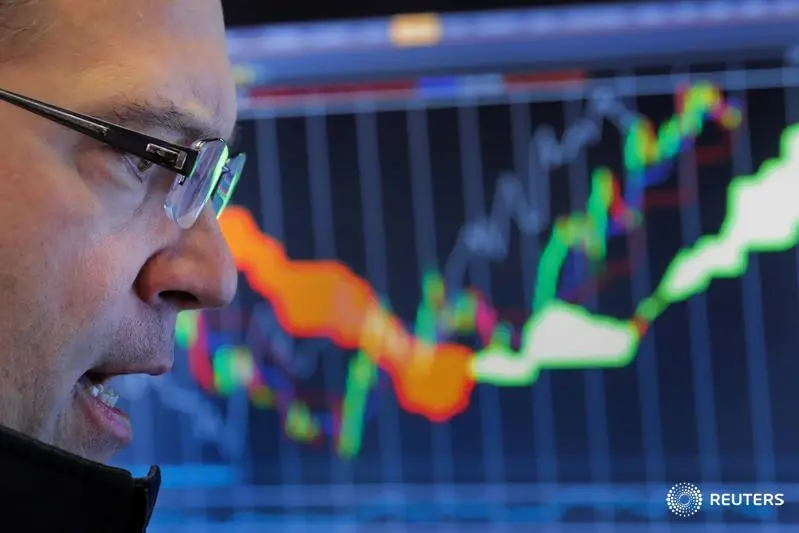PHOTO
- Oil prices dropped close to 2 percent on Friday
- Shares on Wall Street were mainly unchanged on Friday, following five-day rally
- Most stock markets in the Middle East rose on Thursday
- Dollar and gold prices rose on Friday
Oil prices
Oil prices retreated on Friday, as investors worried about a global economic slowdown, but prices managed to end the week higher following sharp rises in the previous sessions, supported by hopes for an easing in tensions between the United States and China.
Brent crude futures dropped $1.2 to settle at $60.48 a barrel, a 1.95 percent loss.
U.S. West Texas Intermediate (WTI) crude futures were down $1 to settle at $51.59 a barrel, or 1.9 percent.
Still, both benchmarks saw their second week of gains, with Brent rising about 6 percent and WTI up about 7.6 percent.
“After a number of days higher, the market is just taking a breather,” Tony Headrick, an energy market analyst at St. Paul, Minnesota commodity brokerage CHS Hedging LLC, told Reuters.
“If we experience an economic slowdown, crude will underperform due to its correlation to growth,” Hue Frame, portfolio manager at Frame Funds in Sydne, told Reuters.
According to a Reuters report, China plans to set a lower economic growth target of 6-6.5 percent in 2019 compared with last year’s target of “around” 6.5 percent, policy sources told Reuters.
Global markets
Shares on Wall Street were mainly flat on Friday, following days of gains.
The Dow Jones Industrial Average fell 5.97 points, or 0.02 percent, to 23,995.95, the S&P 500 lost 0.38 point, or 0.01 percent, to 2,596.26 and the Nasdaq Composite dropped 14.59 points, or 0.21 percent, to 6,971.48.
For the week, the Dow rose 2.4 percent, the S&P 500 added 2.54 percent and the Nasdaq gained 3.45 percent.
The pan-European STOXX 600 benchmark was up 0.09 percent, bringing its weekly gain to 1.7 percent. MSCI’s all-country index, was flat at 473.26.
Middle East markets
Saudi Arabia’s index gained 0.8 percent on Thursday, as Al Rajhi Bank added 1.6 percent and Saudi Basic Industries gained 1.2 percent.
Dubai's index gained 0.2 percent with Emirates NBD rising 0.6 percent and Ajman Bank increasing 2.6 percent.
Abu Dhabi’s index gained 0.2 percent as well, as First Abu Dhabi Bank, the largest bank in the United Arab Emirates, added 0.3 percent and Abu Dhabi Commercial Bank was up 0.6 percent.
Qatar's index rose 1.2 percent to hit its highest since March 2017, with 14 of its twenty stocks gaining. The index was boosted by financial shares, with Industries Qatar adding 2.9 percent and Qatar Islamic Bank increasing 1.3 percent.
Egypt's blue-chip index EGX30 was flat, with El Sewedy Electric adding 2 percent and Commercial International Bank inching up 0.1 percent.
Kuwait’s index gained 1.2 percent, while Oman’s index was mainly flat and Bahrain’s index gained 0.3 percent.
Currencies
The dollar edged higher on Friday after recent drops in the previous sessions when analysts bet that the U.S. Federal Reserve would put its policy tightening on pause in 2019.
The dollar index, which measures the greenback against a basket of six major currencies, rose 0.1 percent to 95.660, but posted its fourth straight weekly decline.
Precious metals
Gold prices rose on Friday, as global markets retreated.
Spot gold was up 0.2 percent at $1,288.47 an ounce by 1:52 p.m. EST (1852 GMT). U.S. gold futures settled 0.2 percent higher at $1,289.5.
(Reporting by Gerard Aoun; Editing by Mily Chakrabarty)
(gerard.aoun@refinitiv.com)
Our Standards: The Thomson Reuters Trust Principles
Disclaimer: This article is provided for informational purposes only. The content does not provide tax, legal or investment advice or opinion regarding the suitability, value or profitability of any particular security, portfolio or investment strategy. Read our full disclaimer policy here.
© ZAWYA 2019





















